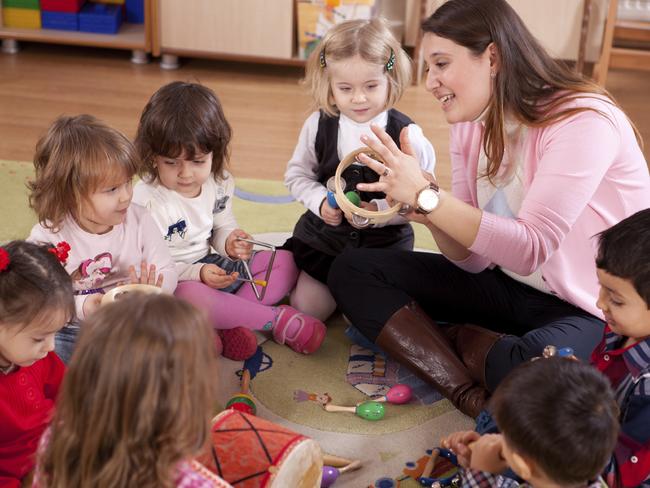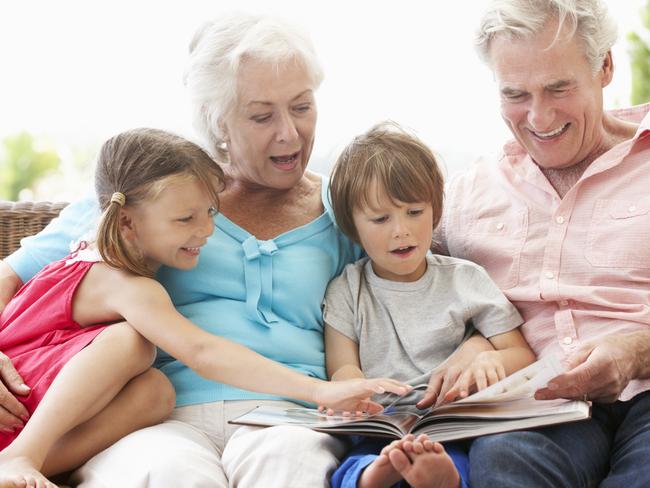Number of children spending 50-plus hours a week in childcare is growing
THE number of children spending 50-plus hours a week in childcare is growing as parents work longer to try to make ends meet.
Parenting
Don't miss out on the headlines from Parenting. Followed categories will be added to My News.
EXCLUSIVE
THE number of children spending 50-plus hours a week in childcare is growing as parents work longer to try and make ends meet.
News Corp Australia can reveal 40,241 children used long daycare for 50 or more hours a week — or more than 10 hours a day — in the latest June quarter figures, up 17 per cent from 34,275 in the previous March quarter.
And fees for childcare are also continuing to grow, with a 3.6 per cent hourly fee growth for long day care from the June quarter 2016 and an average 2.7 per cent growth for all childcare services including before and after school care.
However the percentage growth of fees has dramatically come down since 2009 when it was as high as 12.9 per cent.
The federal government’s Early Childcare in Summary report has shown proportionally 5.9 per cent of all children in long day care are spending 50 or more hours per week at the centre.
This compares to 4.9 per cent in the March quarter.
RELATED: Aussie families paying more than mortgage on childcare

A further 12.7 per cent were spending 40-50 hours in care a week and 23.1 per cent were spending 30-40 hours a week according to the figures.
In June 2016 there were 123,489 children in long day care for more than 40 hours a week, compared to the latest June 2017 data with 126,863 children in care for more than 40 hours, a 2.7 per cent increase.
The report also shows parents are struggling to obtain vacation care during school holidays. In June 2015, 72 per cent of reporting services advised they had vacancies, while in the latest June 2017 quarter just 67 per cent of providers reported having vacancies.
Parents are paying on average $9.20 an hour for long day care, $8.80 an hour for family day care and in-home care, $10.25 an hour for occasional care and $7.20 an hour for outside school hours care.
Education Minister Simon Birmingham said child care fee growth was at its lowest level in a decade.
“After a decade of annual average fee increases of 6.7 per cent and spikes of 14.6 per cent under Labor, we know the pain families have been feeling,” Senator Birmingham said.
“The Turnbull Government has worked hard to keep the lid on fee increases and because we know the pressure child care fees can have on family budgets and there is more help on the way.”
Nicole Lessio, Acting Executive Director of The Parenthood said parents were working longer and harder and it was resulting in their kids spending more time in childcare.
“It’s no wonder children are staying in childcare longer because parents are working longer and harder in order to manage the costs of day-to-day living,” Ms Lessio said.
Social demographer Bernard Salt said the uptick in longer hours was indicative of a higher employment rate.

“I think that the 17 per cent surge in absolute numbers aligns with the significant increase in employment that we have seen,” Mr Salt said.
“Whether it is a good or bad for children I think comes down to the quality of childcare facilities and certainly having more money in the family budget will make a material difference in their lives.”
The government data comes as News Corp can also reveal Australian families saved $2.29 billion over the year from March 2016 to March 2017 by getting grandparents to take on caring for their children and avoiding childcare fees.
RELATED: One in four Aussie children under the age of 12 stalked, harassed and abused online
This was up from $2.12 billion in the previous corresponding period.
Analysis of Australian Bureau of Statistics data by finder.com.au, has revealed almost 900,000 Aussie children aged 0-12 were cared for by their grandparents instead of attending formal daycare — saving their parents a small fortune.
According to the research, almost a quarter of kids aged four and under (23 per cent) were looked after by their grandparents instead of attending childcare.
In the June quarter 2017, 4400 families were assisted with Grandparent Child Care Benefit. This represented 0.5 per cent of the total number of families who used approved child care services.
For more information on how the new childcare subsidy that comes into place on July 1 will impact your rebate and family visit: www.education.gov.au/childcare
CHILDCARE DATA (JUNE 2017)
• 1,268,140 children attended approved child care, up 1.4 per cent since the June quarter 2016.
• 874,020 families had at least one child in approved child care, an increase of 2.6 per cent since the June quarter 2016.
• 18,461 approved child care services operated in Australia, an increase of 2.6 per cent since the June quarter 2016.
• The total estimated Child Care Benefit and Child Care Rebate entitlement was $1,602.5 million, down 2.5 per cent since the June quarter 2016.
• While most children who used approved child care, used services located in major cities (996,060 children), around one in five (278,450 or 22.0 per cent) children used services located in regional and remote areas.
• Across Australia, nearly two-thirds (560,260 or 64.1 per cent) of all families had children in Long Day Care and around one-third of families had children in Outside School Hours Care (310,090 or 35.5 per cent).
• In the June quarter 2017, 4,400 families were assisted with Grandparent Child Care Benefit. This represented 0.5 per cent of the total number of families who used approved child care services.
STATE BREAKDOWNS
NSW
Children in approved childcare services: 425,100
Number of families using approved child care: 296,560
Estimated Child Care Benefit: $263,607,000
Estimated Child Care Rebate: $292,522,000
VIC
Children in approved childcare services: 316,140
Number of families using approved child care: 214,770
Estimated Child Care Benefit: $235,577,000
Estimated Child Care Rebate: $209,082,000
QLD
Children in approved childcare services: 286,840
Number of families using approved child care: 195,350
Estimated Child Care Benefit: $178,300,000
Estimated Child Care Rebate: $171,190,000
SA
Children in approved childcare services: 83,650
Number of families using approved child care: 57,270
Estimated Child Care Benefit: $36,709,000
Estimated Child Care Rebate: $43,558,000
WA
Children in approved childcare services: 97,490
Number of families using approved child care: 69,450
Estimated Child Care Benefit: $45,664,000
Estimated Child Care Rebate: $63,250,000
TAS
Children in approved childcare services: 22,240
Number of families using approved child care: 15,580
Estimated Child Care Benefit: $10,188,000
Estimated Child Care Rebate: $11,493,000
NT
Children in approved childcare services: 9,920
Number of families using approved child care: 7,000
Estimated Child Care Benefit: $3,658,000
Estimated Child Care Rebate: $7,448,000
ACT
Children in approved childcare services: 29,090
Number of families using approved child care: 20,060
Estimated Child Care Benefit: $7,418,000
Estimated Child Care Rebate: $22,814,000


